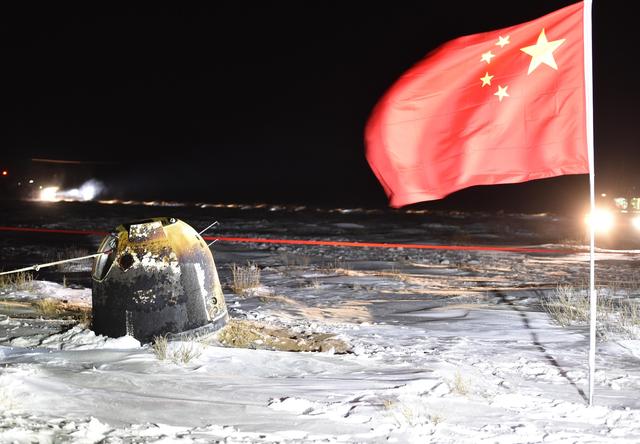China's Chang'e-5 probe has returned home with lunar samples after weeks of space travel.
It brought back the first new samples of rock and debris from the Moon in more than four decades.
The probe was launched on November 24 and landed on the near side of the moon a week later. Then, it collected samples from both the lunar surface and just beneath it.
President Xi Jinping has sent a congratulating message on the success of the mission.

Figures from the European Union show that China remained the bloc's top trading partner as of October.
The EU's trade in goods with China in the first ten months stood close to 480 billion euros, roughly 580 billion U.S. dollars, up by 2.2 percent year on year.
Its trade in goods with the United States fell by over 11 percent to 460 billion euros.
China overtook the U.S. as the EU's top trading partner in July.
The U.S. Federal Reserve says it will keep buying government bonds until the economy makes substantial progress.
It's seen as a step intended to reassure financial markets and keep long-term borrowing rates low indefinitely.
The Fed also reiterated that it expects to keep its short-term benchmark interest rate near zero through at least 2023.
The agency has kept its key rate there since March, when it took a range of extraordinary steps to fight the pandemic recession by keeping credit flowing.
Germany has approved a bill that will require companies involved in setting up critical infrastructure such as high-speed 5G networks to guarantee that their equipment can't be used for sabotage, espionage or terrorism.
Companies will be required to submit a document that contains details on how they ensure that components of critical systems can't be misused for illegal purposes.
Any vendor that fails to meet the threshold for trustworthiness can be banned from operating equipment.
The measure doesn't amount to an outright ban on Huawei in Germany, as demanded by the United States.
The Trump administration had threatened to cut off intelligence sharing with countries that use Huawei gear.
Huawei denies U.S. allegations of links to the Chinese government.
Brazilian President Jair Bolsonaro has presented his government's COVID-19 national immunization plan.
Bolsonaro says the start date for vaccinations depends on approval by Brazil's regulator.
The plan presented shows priority for health workers and those most vulnerable to the disease.
Last Friday, the Supreme Court ordered the government to provide the immunization strategy amid criticism of it not being provided sooner.
Bolsonaro, who suffered from COVID-19 earlier this year, says he will not take any vaccine.
Brazil has recorded almost 183,000 deaths from COVID-19 since the outbreak began in the country.
The Chilean Institute of Public Health has authorized the use of the Pfizer-BioNTech vaccine, as COVID-19 cases show a slight but sustained increase.
Chile has signed deals to buy about 10 million doses from Pfizer, but the country's health ministry is yet to decide when to start the vaccination campaign.
Healthcare workers, public transport drivers and the armed forces will be first in line to get the shot.
Pfizer's vaccine needs to be kept at extremely low temperatures, which is expected to complicate distribution across Chile's 4,000 km length.
Chile has reached agreements with several laboratories to ensure 32.4 million doses for 16 million of the country's 19 million people.
Canada has signed an agreement with the United States to send a Canadian astronaut around the moon in 2023.
The Gateway Treaty includes a commitment to having a Canadian on board when the U.S. conducts a flyby of the moon in 2023, as well as a second flight to a future international space station.
But it will not include a moon landing.
Canada will also contribute a robotic arm to help with the construction of the Lunar Gateway, which will allow for exploration of the lunar surface and assist future missions to Mars.












